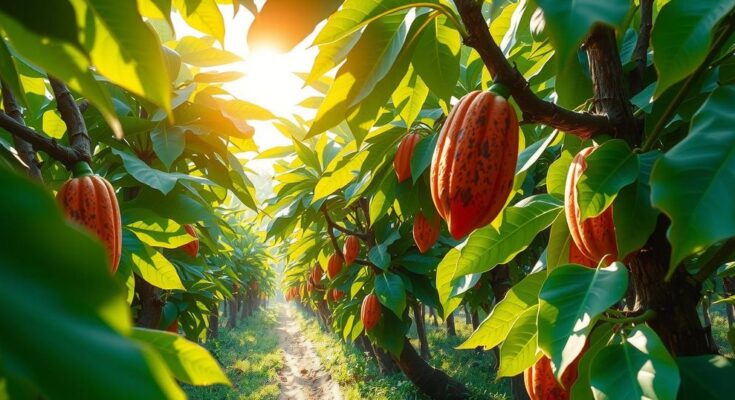Nigeria is targeting increased cocoa production to capitalize on soaring global prices, aiming for 500,000 tonnes by 2024-2025. Local companies are showing interest in investing, reviving the sector amid challenges. However, environmental risks and small-scale farmer limitations present significant hurdles to achieving growth.
Nigeria is aiming to expand its role in the cocoa sector, driven by skyrocketing global cocoa prices that reached a peak of $12,000 per tonne in December. This surge has reignited interest in cocoa farming within the country amidst challenges in diversifying its oil-dependent economy. Many local firms are now looking to invest in or enhance cocoa production, as noted by Patrick Adebola of the Cocoa Research Institute of Nigeria, who stated, “The farmers have never had it so good.”
The country ranks as the seventh largest cocoa producer, yielding over 280,000 tonnes in 2023, per the United Nations’ Food and Agriculture Organization. The Nigerian government has ambitious plans to increase production to 500,000 tonnes by the 2024-2025 season, potentially positioning the nation in fourth place globally, behind Ivory Coast, Ghana, and Indonesia. Although Adebola casts doubt on the immediate achievement of this goal, he sees potential growth in the coming years through efforts to revive old plantations.
Cocoa prices in New York have stabilized at over $8,000 per tonne after significant fluctuations, yet this remains considerably higher than the previous averages of $2,000 to $3,000. Comrade Adeola Adegoke, president of the Cocoa Farmers Association of Nigeria, indicated that more individuals are engaging in cocoa production to capitalize on the current favorable prices.
Ivory Coast maintains its status as the largest cocoa producer, but recent adverse weather and diseases have led to poor harvests in both Ivory Coast and Ghana, thereby creating supply shortages and driving global prices higher. In contrast, Nigeria’s cocoa sector has been less affected by climate change thus far. However, there are concerns about the environmental impact of expanding cocoa farming, particularly through monocropping methods promoted by the National Cocoa Management Committee.
Challenges remain as much of Nigeria’s cocoa is produced by small-scale farmers like Peter Okunde, who expressed the need for adequate land and investment to grow their farms. John Alamu from Johnvents countered that the primary issue is not the availability of land but the need for comprehensive support systems, such as seedling provision and sustainable agriculture initiatives to help farmers regain Nigeria’s leading position in cocoa production.
In summary, Nigeria is poised to increase its cocoa production in response to soaring global prices, with hopes of challenging leading producers in West Africa. While the potential for expansion exists, challenges related to funding and farming methods must be addressed to ensure sustainable growth in the sector. The government’s efforts to regulate the industry and support farmers will be crucial to achieving these ambitious production goals.
Original Source: www.iosconews.com




